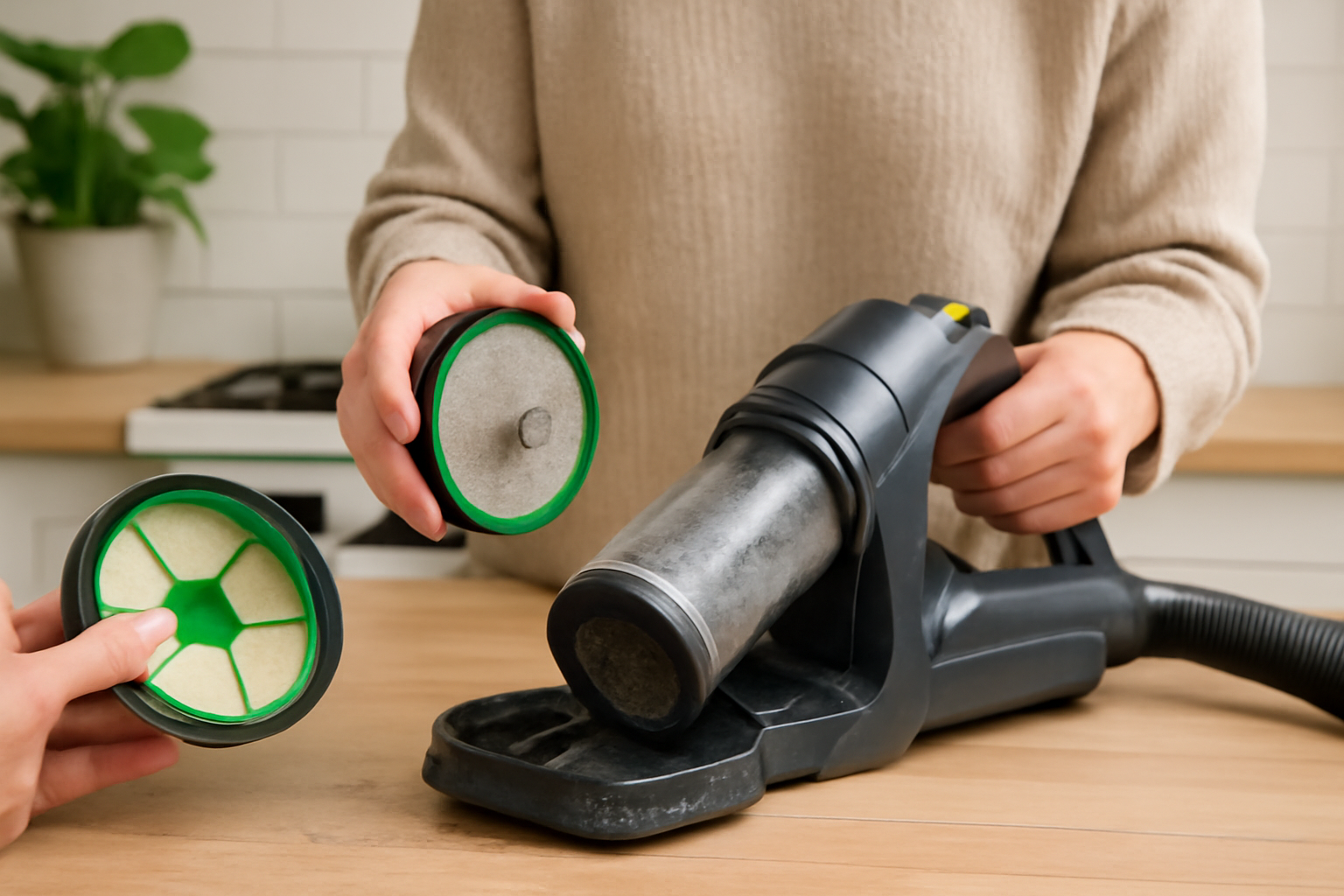
If you’re a pet owner, you know the struggle of keeping your home clean and allergen-free. Pets shed hair, dander, and dirt, and your vacuum is your best defense against these messes. One of the most important features of a vacuum, especially for pet owners, is the HEPA filter. A HEPA (High-Efficiency Particulate Air) filter is designed to trap tiny particles such as dust, pet dander, and other allergens, ensuring cleaner air and surfaces in your home. However, like all filters, a HEPA filter requires proper maintenance to ensure optimal performance and extend the life of your vacuum.
In this article, we’ll discuss how to maintain your HEPA filter to keep your vacuum running efficiently and how to ensure your vacuum’s longevity.
1. Regularly Clean or Replace Your HEPA Filter 🧼🛠️
The most important aspect of HEPA filter maintenance is cleaning or replacing the filter at the appropriate intervals. Over time, pet hair, dust, and allergens can clog the filter, causing reduced suction and airflow. Depending on the model of your vacuum, you may need to clean or replace the filter every 3–6 months.
How to clean:
Turn off and unplug your vacuum.
Remove the HEPA filter as directed by the manufacturer.
Rinse the filter under cold water (do not use soap or detergent).
Allow it to dry completely before reinserting it into your vacuum.
If your filter is too dirty or damaged, replace it with a new one.
Benefit: Regular cleaning or replacement ensures consistent suction power and extends the life of your vacuum.
2. Keep Your Vacuum’s Filter Dry 🌬️💧
Moisture can damage a HEPA filter and cause mold or mildew growth, which can lead to unpleasant odors and reduced efficiency. When cleaning your filter, never reinsert a wet filter back into your vacuum. After washing, allow it to dry completely before reinserting it.
Benefit: Keeping the filter dry prevents mold buildup and ensures it continues to work properly.
3. Empty the Vacuum Bin Regularly 🧹🔄
Even with a HEPA filter, your vacuum will become less efficient if the dustbin or bag is too full. Pet hair and debris will clog the filter faster, and your vacuum may lose suction. To avoid this, empty your vacuum’s dustbin before it reaches its maximum capacity. If your vacuum uses bags, make sure to change them regularly.
Benefit: Prevents dust and debris from getting caught in the filter, maintaining suction power.
4. Clean the Vacuum’s Brush Rolls and Beater Bars 🐾💡
Pet hair and dirt can easily get tangled in the brush rolls and beater bars, preventing your vacuum from working efficiently. Regularly clean the brush rolls to remove hair and dirt that may have accumulated. If your vacuum features a self-cleaning brush, make sure to remove any buildup manually if necessary.
How to clean:
Turn off and unplug the vacuum.
Remove hair, debris, or dirt from the brush rolls using scissors or your hands.
Check for any tangled hair or string and cut or pull it out.
Benefit: Cleaning brush rolls ensures that your vacuum maintains its cleaning power and prevents clogs in the filter.
5. Check for Blockages in the Hoses 🧑🔧🛠️
Hoses and air pathways can become blocked by pet hair, dirt, and debris, which may cause the vacuum’s suction to drop significantly. Regularly inspect the hoses and air pathways for any blockages. If you find any, carefully remove the obstruction to ensure smooth airflow.
How to check:
Turn off and unplug the vacuum.
Remove the hose and inspect it for visible blockages.
Use a long, flexible tool to dislodge any trapped debris.
Benefit: Keeping hoses clear ensures that air can flow freely, which will maintain suction power and reduce wear on your vacuum.
6. Store Your Vacuum Properly 🏠🔌
When not in use, store your vacuum in a cool, dry place to protect the HEPA filter from moisture, extreme temperatures, and dust. Avoid storing your vacuum in damp or humid areas like basements or garages. Always unplug the vacuum and wrap the cord neatly to avoid tangling.
Benefit: Proper storage helps protect the vacuum’s internal components, including the HEPA filter, extending its lifespan.
Conclusion: Keep Your Pet Vacuum Running Like New 🧹✨
A HEPA filter vacuum is an essential tool for every pet owner, helping you keep your home clean and free of allergens. However, just like any appliance, your vacuum requires regular maintenance to stay in top condition. By following these simple maintenance tips—cleaning or replacing your filter, emptying the dustbin, checking for blockages, and cleaning brush rolls—you can extend the life of your vacuum and ensure it performs optimally for years to come.
Pro Tip: If you're noticing reduced suction despite maintaining your HEPA filter, it might be time for a vacuum tune-up or a replacement filter. Regular maintenance ensures your vacuum stays powerful enough to tackle the toughest pet hair messes.
For more information on HEPA filter vacuums and maintenance tips, visit www.lxvacuum.com. 🧹🌿
SEO TAGS
HEPA Filter Maintenance, Pet Vacuum Maintenance, Vacuum Filter Cleaning, Pet Hair Vacuum, Vacuum for Pet Owners, Best Vacuum for Pet Hair, Vacuum Cleaner Maintenance, Extending Vacuum Life, Vacuum for Allergies, HEPA Vacuum Cleaner, Pet Hair Remover, Vacuum for Pet Dander, HEPA Filter Care.
















